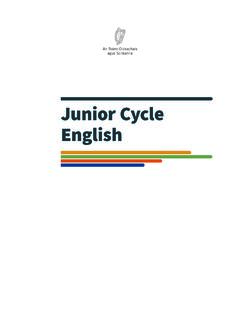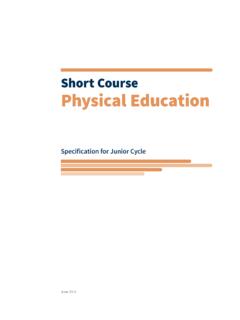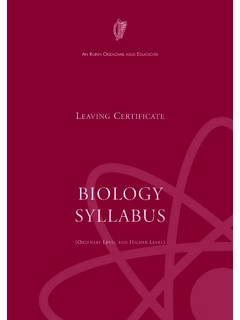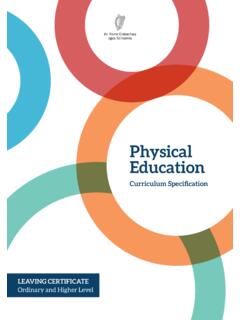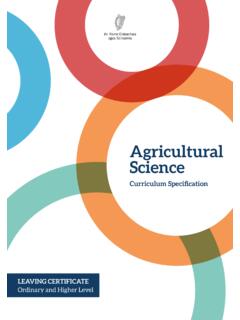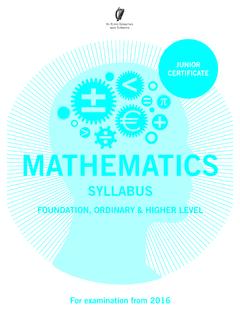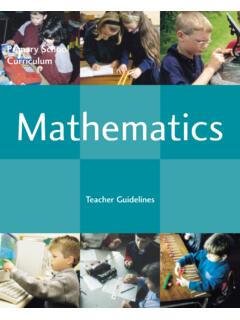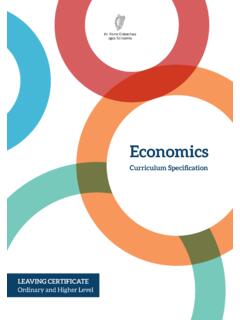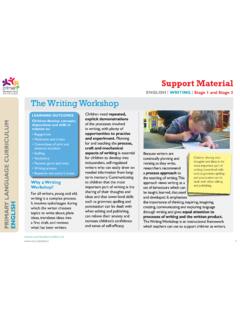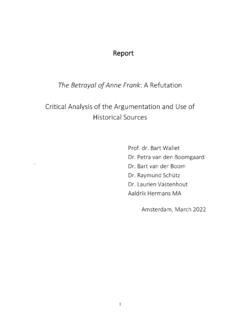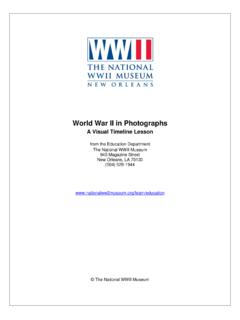Transcription of Junior Cycle History - Curriculum
1 Junior Cycle HistoryContents 3 Introduction to Junior cycle4 Rationale 6 Aim 7 Overview: LinksStatements of Learning Junior Cycle History and Key Skills 10 Overview: CourseContinuity and Progression15 Expectations for StudentsLearning Outcomes19 Assessment and Reporting23 Appendix AGlossary of action verbs26 Appendix BGlossary of History terms PagePagePagePagePagePagePagePagePageJuni or Cycle HistoryIntroduction to Junior cycle3 Introduction to Junior cycleJunior Cycle education places students at the centre of the educational experience, enabling them to actively participate in their communities and in society, and to be resourceful and confident learners in all aspects and stages of their lives.
2 Junior Cycle is inclusive of all students and contributes to equality of opportunity, participation and outcome for Junior Cycle allows students to make a greater connection with learning by focusing on the quality of learning that takes place, and by offering experiences that are engaging and enjoyable for them, and are relevant to their lives. These experiences are of a high quality: they contribute directly to the physical, mental and social wellbeing of learners; and where possible, provide opportunities for them to develop their abilities and talents in the areas of creativity, innovation and enterprise. The Junior Cycle programme builds on students learning to date and actively supports their progress; it enables them to develop the learning skills that will assist them in meeting the challenges of life beyond Cycle HistoryRationale4 Rationale The study of History is about exploring human experience over time and how that experience has shaped the world we live in today.
3 By asking questions of available evidence, students of History can make rational, informed judgements about human actions in the past and examine why people were motivated to act as they did and the effects of these actions. Studying History develops our historical consciousness, enabling us to orient ourselves in time and to place our experiences in a broader framework of human experience. Being historically conscious transforms the way that we perceive the world and our place in it, and informs how we see the future development of the a big picture of the past helps to develop our historical consciousness. It allows us to see major patterns of change and gives us a framework to understand and put into context the knowledge that we gain about the actions of people that came before us.
4 Investigating evidence to identify moments or patterns of change in the human experience, and to make judgements on the significance of such change, is the key practice of the historian. This study of change relates to the fullness of human experience over time, from the initial emergence of humans to the more recent past. The study of the past allows us to examine the impact of human actions in a wide variety of dimensions, including politics, government, law, society, economics, culture, beliefs and ideas. When we learn about the past, it is important also that we understand the nature of History as a discipline that allows us to make sense of what has happened in our world over time.
5 This involves understanding such concepts as: continuity and change; time and space; how evidence allows us to make judgements about the past and how such judgements may need to be changed if new evidence emerges; awareness of the usefulness and limitations of different forms of evidence and the importance of being objective and fair when investigating the actions of people in the past, and taking care not to let opinions or prejudices affect our judgements; how human actions in the past have different levels of significance; that we see people in the past and their actions in the context of the time in which they lived. Understanding the actions of people in the past and understanding how we come to know about these actions helps us to develop positive values about History .
6 These include a respect for truth and evidence, a commitment to being open to seeing the past from different perspectives and a Junior Cycle HistoryRationale5regard for the integrity of the past. This way of seeing the world deepens our understanding of the relationship between past and current events and the forces that drive change; helps us to appreciate how diverse values, beliefs and traditions have contributed to the culture in which we live; and enables us to value our local, national and international heritage. The ability to construct and communicate coherent, logical arguments on matters of historical significance, and in so doing utilise skills such as thinking critically, working collaboratively and utilising digital media effectively, is also enhanced by the study of History .
7 Studying History helps us also to develop a historical sensibility that leads to an appreciation of the cultural achievements and accomplishments of previous generations, and to derive pleasure and enjoyment from learning about the richness and diversity of human experience in the past, and how this has impacted on and shaped our own identity and experience of the Cycle HistoryAim6 Aim The study of History at Junior Cycle aims to enable students to develop the necessary conceptual understanding, disciplinary skills and subject knowledge to investigate the actions of people in the past and to come to a deeper understanding of the human condition. Students also come to see the world, and their place in it, from a historical perspective; and understand how the people and events of the past have shaped the contemporary exploring the past from a historical perspective, students also develop an interest and enthusiasm for History and acquire values and attitudes that shape their view of people in the past, including a regard for heritage and their cultural inheritance, and a sense of historical empathy, where people are judged in the context and values of the time in which they lived.
8 The study of History instils in students a respect for integrity, objectivity and looking at issues from different perspectives. This capacity for critical thinking helps them to interrogate sources of evidence and make judgements about the viewpoint expressed, including the capacity to identify propaganda. Hearing and telling the stories of people who lived in the past helps students to understand more about how people live today; and can help students to learn from the past when thinking about how to address the problems of Cycle HistoryOverview: Links7 Overview: LinksThe tables on the following pages show how History is linked to central features of learning and teaching outlined in the Framework for Junior Cycle 2015.
9 Table 1: Links between Junior Cycle History and the statements of learningSTATEMENTS OF LEARNINGThe statementExamples of relevant learningSOL 3: The student creates, appreciates and critically interprets a wide range of will interrogate a range of primary and secondary historical sources and will use their historical knowledge and conceptual understanding to produce their own texts using a variety of 6: The student appreciates and respects how diverse values, beliefs and traditions have contributed to the communities and culture in which he/she will learn about the roots of their historical inheritance through exploring aspects of the History of their own locality, such as interviewing older people about religious practices and 7.
10 The student values what it means to be an active citizen, with rights and responsibilities to local and wider will explore how the role of the individual in society evolved over time, including an exploration of the concept of rights and citizenship, by exploring how ordinary people lived under different systems of government, such as Nazi Germany or the Soviet 8: The student values local, national and international heritage, understands the importance of the relationship between past and current events and the forces that drive will explore why certain historical events are commemorated, such as the holocaust ; they will investigate the historical roots of a contemporary issue or theme, and examine how, for example, the Crusades have impacted on the modern 9: The student understands the origins and impact of social, economic and environmental aspects of the world around student will explore social change by looking at causes and consequences of migration patterns or population change, such as those caused by the Black Death or by exploring how migration and settlement affected identity on the island of 18.
